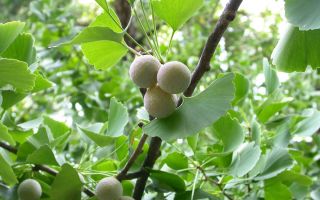Content
- 1 What is and what does ginkgo biloba look like?
- 2 Where does ginkgo biloba grow?
- 3 The chemical composition of ginkgo biloba
- 4 What is ginkgo biloba used for and what it helps
- 5 Cooking methods
- 6 The use of the leaves of the ginkgo biloba tree in traditional medicine
- 7 The use of ginkgo biloba in cosmetology
- 8 Slimming application
- 9 Contraindications and side effects of ginkgo biloba
- 10 Collection and procurement
- 11 Conclusion
- 12 Reviews of ginkgo biloba
The medicinal properties of the herb ginkgo biloba and contraindications are of particular interest to pharmaceutical companies. It is used as an active ingredient in dietary supplements. They are intended to treat vascular diseases and improve memory.
What is and what does ginkgo biloba look like?
Ginkgo is a relict gymnosperm plant belonging to the Ginkgo family. It belongs to the descendants of seed ferns and is considered a living fossil. Ginkgo biloba is an extract from the leaves of this plant. It is widely used in medicine.
The height of the ginkgo tree can reach 50 cm. Its leaves are shaped like fans. They are 12 cm long and 8 cm wide. The tree is dioecious, it can be either female or male. The male trees contain pollen and peculiar earrings. After the pollination process carried out by the wind, an ovary appears on the female trees.
Ginkgo wood is very durable and wind resistant. A distinctive feature is the presence of stilted roots located at the base of the tree. They provide additional nutrition and support to the plant. The flowering process of ginkgo occurs every 26-28 years. The fruits are orange drupes, the diameter of which is 3 cm. The seeds are light beige in color. Ginkgo fruits give off a very repulsive smell.
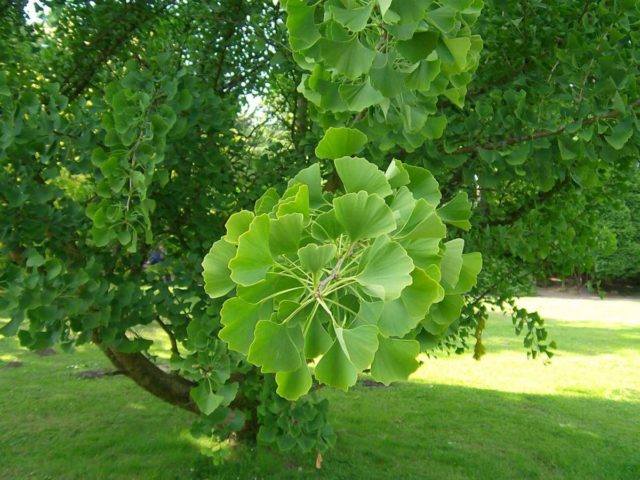
Where does ginkgo biloba grow?
China is considered the birthplace of ginkgo biloba. There, the plant can be found in the Tian Mu Shan reserve. It needs a high-altitude climate with high air humidity and acidic soils. Most often, ginkgo is found near waterfalls and along river banks. However, trees will do well on rocky terrain.
The chemical composition of ginkgo biloba
The medicinal properties of the ginkgo biloba plant are due to its rich chemical composition. Thanks to them, the leafy part is often used for the manufacture of fortifying teas, tablets and solutions. The composition of the plant is represented by the following substances:
- amino acids;
- thymine;
- ginkgolic acids;
- condensed tannins;
- micro- and macroelements (phosphorus, magnesium, iron, titanium, selenium);
- benzoic acid;
- flavonoids.
The task of condensed tannins is to stop the inflammatory process. Amino acids take part in metabolic processes, contributing to weight loss.Flavonoids have a pronounced antioxidant effect, protecting the body from the harmful effects of toxins. Benzoic acid has antibacterial and antifungal effects. But at the same time, it increases the burden on the kidneys.
What is ginkgo biloba used for and what it helps
The mechanism of action of ginkgo biloba is based on antioxidant and anti-inflammatory properties. It is not for nothing that he has been called the tree of life since ancient times. The extract is used for general strengthening of the body and solving certain problems. It protects against the harmful effects of free radicals and helps to normalize blood circulation. Thanks to its antioxidant properties, the plant slows down the aging process. The extract is especially effective against the following diseases:
- neurosensory disorders;
- complications after traumatic brain injury;
- sleep disturbance;
- headaches;
- neuropsychological exhaustion;
- violation of peripheral blood supply;
- diabetic retinopathy.
Among other things, the healing properties of ginkgo biloba make it possible to use it in the fight against increased anxiety and ophthalmological diseases. The fight against depression is carried out by stimulating the production of adrenaline. The vasodilating effect of the extract helps to cope with headaches. It is also able to lower the level of bad cholesterol in the blood, preventing atherosclerosis.
In old age, herbal extract is used to eliminate age-related disorders. These include venous insufficiency, memory impairment, tinnitus, and impaired vision. In addition, the remedy activates the protective functions of the body.
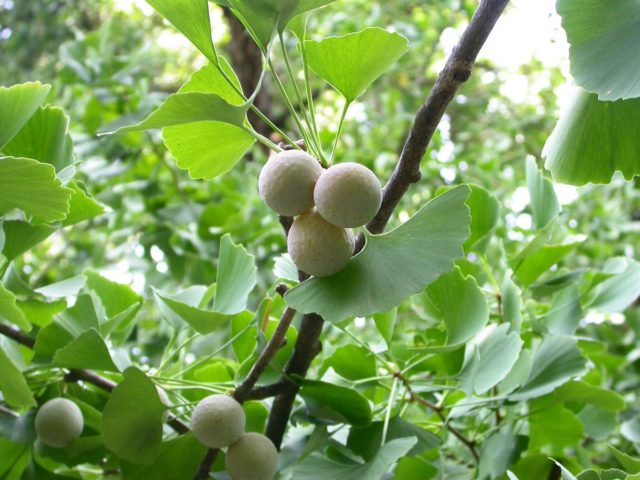
The benefits of ginkgo biloba for women
Among the indications for the use of ginkgo biloba, the manifestation of PMS in women is distinguished. The substances that make up the plant will reduce anxiety and increased irritability. They help the body deal with the high levels of stress hormones that are overproduced before menstruation. The antioxidant properties of the plant extract help to improve skin condition and prevent age-related changes. It is believed that the herbal extract is also able to enhance sex drive.
Why is ginkgo biloba useful for men?
Ginkgo biloba effectively treats male diseases. It is often taken to stimulate potency as part of a comprehensive treatment. The desired effect is achieved by normalizing blood circulation. Due to this, the blood rushes to the genitals more intensively, improving their functioning. In addition, ginkgo biloba extract reduces the risk of heart attack and stroke in older men.
Benefits of Ginkgo Biloba for Children
In childhood, the plant extract is indicated for admission with memory loss and mental impairment. It is sometimes prescribed to treat obstructive pulmonary disease. In addition, the plant extract has a tonic effect on the body, protecting against colds and viral diseases. The dosage of ginkgo biloba for children is set individually by the pediatrician.
Cooking methods
In alternative medicine, the use of ginkgo biloba leaves at home is widespread. Alcohol tinctures, fortifying teas, infusions and decoctions are made from them. There are several options for the preparation of remedies based on ginkgo biloba. They differ in their formulation and effect on the body.
How to brew ginkgo biloba leaf tea properly
Dried leaves are not recommended to be brewed with too hot water. In this case, the taste of the finished drink will change. The grind of the leaves should be medium.They should not be chopped to a powdery state. It is recommended to use a coffee grinder for grinding raw materials.
Infusion
Ginkgo biloba water infusion helps with glaucoma. It is recommended for those who are prohibited from alcohol tincture. The remedy should be taken half an hour before meals, 60-70 ml 3 times a day.
Components:
- 1 tbsp. l. dried raw materials;
- 1 tbsp. water.
Recipe:
- The crushed leaves are poured into a container and filled with water.
- Within 2 hours, the drink is kept under the lid.
- After a specified time, the liquid is filtered and taken according to the prescribed scheme.
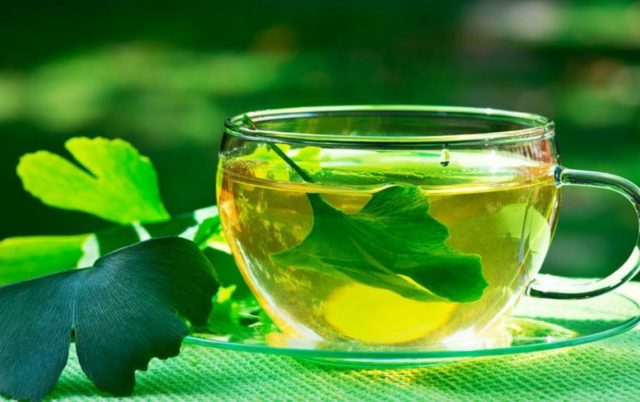
Decoction
Herbal decoction is in demand when it is necessary to treat cardiovascular diseases. It has a vasodilating effect and strengthens the capillaries. It is often used to treat infectious diseases of the respiratory system. The broth is taken 70-100 ml 3 times a day. The duration of treatment is 2 months.
Ingredients:
- 15 g leaves;
- 1 tbsp. hot water.
Cooking steps:
- The leaves are poured with water and put on fire.
- The drink is prepared in a water bath for 15 minutes.
- After removing from heat, the broth is kept under a lid until it cools completely.
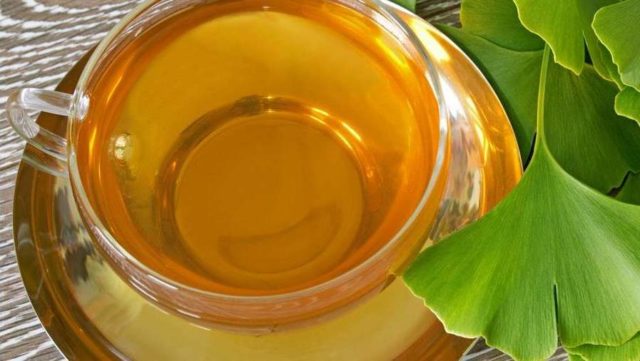
Tincture
The tincture is recommended for people engaged in mental work. Before use 1 tsp. the drink is diluted with a little water. Reception is carried out 3 times a day before meals. The treatment course lasts 1 month.
Components:
- 25 g dried leaves;
- 250 ml of 40% alcohol.
Cooking process:
- The leaves are placed in a dark glass bottle and then poured with alcohol.
- The container is sealed and put away in a dark place.
- After 2 weeks, the tincture is filtered and taken according to the required scheme.
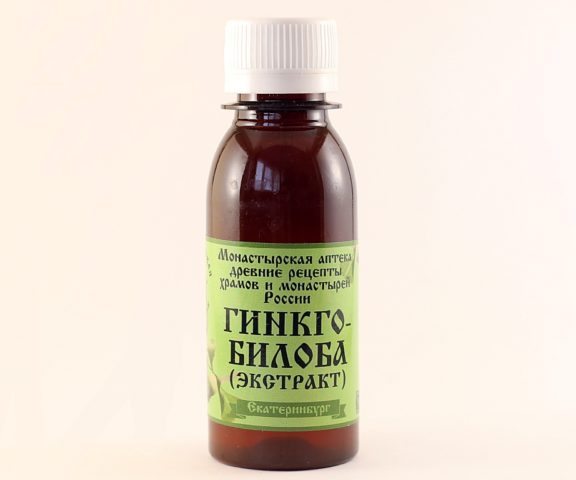
The use of the leaves of the ginkgo biloba tree in traditional medicine
Knowing the benefits and harms of ginkgo biloba for the body, you can effectively use it in the fight against various diseases. It is extremely important to observe the selected dosage and take into account all contraindications. But first, you should exclude the presence of allergies.
To improve vision
The herbal extract is effective in eliminating red eye syndrome and treating conjunctivitis. In addition, it slows down the progression of degenerative diseases of the visual system. Several studies show that ginkgo biloba extract has the ability to improve vision by stimulating blood flow.
For migraine
Migraines are often the result of inappropriate circulation in the head. It can also indicate the presence of vascular disease. The benefits of ginkgo biloba for the brain are vasodilating effects and a positive effect on neurosensory functions. A persistent therapeutic effect from the use of the herbal extract is observed after 3 months of regular intake.
To increase libido
Thanks to its ability to relax smooth muscles and stimulate blood flow, the remedy has a positive effect on libido. It is sometimes prescribed in conjunction with other drugs to treat male sexual dysfunction. However, the effect of therapy is cumulative, so ginkgo biloba must be taken for a long time.
ADHD
ADHD is attention deficit hyperactivity disorder. In most cases, it is diagnosed in childhood. The problem is accompanied by impaired blood circulation in the brain. Taking ginkgo biloba can help alleviate this problem by reducing the intensity of symptoms.
For heart health
Significant benefits of ginkgo biloba for the human body are observed in relation to the cardiovascular system. By reducing the level of harmful cholesterol, the plant extract prevents the formation of atherosclerotic plaques in the vascular cavity. This significantly reduces the likelihood of developing heart attacks and strokes.
The use of ginkgo biloba in cosmetology
The plant extract contains substances that have a beneficial effect on the condition of the skin. They prevent the appearance of visible age-related changes. That is why ginkgo biloba extract can be found in cosmetics designed to preserve youthful skin. At home, the leaves are used to make compresses to relieve puffiness and vitamin face masks.
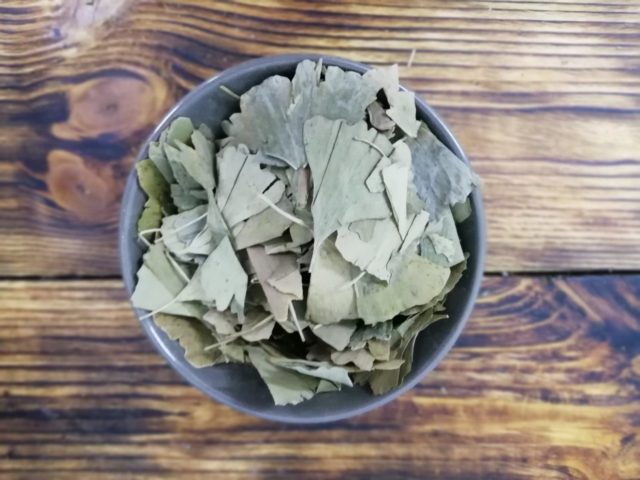
Slimming application
The use of the fruit of ginkgo biloba is widespread in the fight against obesity. A tea drink is prepared from them. It perfectly quenches thirst and has a strengthening effect on the body. Its components start metabolic processes and normalize digestion. Simultaneously with the intake of the plant extract, it is necessary to correct the daily diet.
The antioxidant properties of the ginkgo biloba fruit ensure the elimination of toxins. Puffiness is also removed, due to which the weight is significantly reduced. The result of taking a medicinal drink can be seen at 2-3 months of admission.
Contraindications and side effects of ginkgo biloba
Before using ginkgo biloba, you should study the list of contraindications and possible side effects. In most cases, it is tolerated without complications. But no one is immune from the negative reactions of the body.
Contraindications for ginkgo biloba include:
- acute disorders of cerebral circulation;
- age under 18;
- erosive gastritis;
- myocardial infarction;
- lactation and pregnancy;
- arterial hypotension;
- hypocoagulation;
- individual intolerance;
- stomach ulcer.
In case of ignoring contraindications and improper use of the herbal extract, side effects develop. The most common of these are headaches and indigestion. In rare cases, there is increased salivation, tinnitus, and loss of appetite. As a result of allergies, skin rashes, itching and swelling of the mucous membranes are possible.
An equally important point is the possibility of combining a medicinal product with medications. The combination with medicines containing heptaminol hydrochloride can provoke heart palpitations and increased blood pressure. It should also be remembered that ginkgo biloba reduces the effectiveness of efavirenz.
Collection and procurement
For medicinal use, the seeds and leaves of ginkgo biloba are harvested. The collection can be carried out throughout the growing season. It runs from April to September. The most valuable is the raw material collected in the fall. Only green foliage should be harvested for further drying. There should be no damage or suspicious stains on its surface. The collected raw materials are dried in the fresh air, out of the reach of direct sunlight. For this purpose, use a shed or attic. It is also allowed to dry ginkgo biloba leaves in the oven.
The dried leaves are stored in cardboard boxes or linen bags at room temperature. They must be protected from moisture and direct sunlight. The shelf life of Ginkgo biloba leaves is 1 year.
Conclusion
The medicinal properties of the herb ginkgo biloba and contraindications are especially important for people with chronic diseases.Before using a remedy, it is advisable to consult a doctor. The correct approach to herbal medicine will allow you to cope with the existing problem without facing side effects.

